Our planet is actually colder than previous eras when life already existed, and, believe it or not, carbon dioxide does not have any clear correlation with global temperature growth. Examining climate fluctuations and natural dynamics from over 12,000 or 50,000 years appears to discredit the arguments of climate-change alarmists and the assertion of man-made global warming.
The documentary The Environment: A True Story invites us to rethink global warming and to question what the media and some influential actors say about it. Produced by Canadian history professor John Robson, the film presents historical evidence and comments from climate scientists, such as climatologist Richard Keen from the University of Colorado, Boulder, to demonstrate that “alarmism is not a good science.”
Robson, who describes himself as a passionate environmentalist, demonstrates in two hours and 40 minutes that the Earth’s climate has always fluctuated. It is, therefore, derelict to blame humans for something that already happened when dinosaurs roamed the Earth. It is even worse to study global warming with computer models originally designed to predict natural phenomenon that have, at most, only 150 years of recorded data.
Robson claims that a historical overview of the geographical and weather conditions of the planet is enough to shake up the commonly accepted belief in man-made global warming.
The interviewed specialists explain that the Earth passes through cycles of big ice ages and big melts. The Holocene epoch — the period since the last ice age — began 12,000 years back and has permitted human life, but it is actually an interglacial stage. Now the Earth is approaching the next big melt, and that explains some rising temperatures in recent years.
Robson suggests another key line of reasoning: the natural processes of the Earth recycle and reuse almost everything, including carbon dioxide. CO2 emissions are not as harmful as alarmists argue, and their presence “does not explain the climate variability” to the degree that sun activity does. In other words, the magnetic field of the sun alters the physical dynamics of the Earth, particularly those related to the water cycle. Therefore, the climate scientists presented argue that water vapor is instead the most important greenhouse gas when it comes to global temperature change.
Despite the film’s long duration of almost three hours, it addresses specific topics in brief scenes and presents consistent evidence against the analyses that favor man-made global warming. Robson finally recommends that decision-makers, who are wrongly basing their policies on alarmist analyses, stop wasting money and time on trying to solve a natural event and deal instead with real threats, such as withdrawing plastic from the oceans and taking conscious care of “our only home,” the Earth.
This article was first published by AIER.




